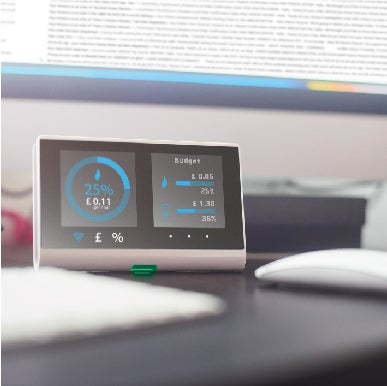What are business energy monitors?
A business energy monitor is a device that’s connected to your electricity meter to keep track of your usage. These usage figures are transmitted from your meter to a separate display unit so you can easily see how and when you’re using energy.
Five-point summary
- Business energy monitors connect to your electricity meter via a sensor, which tracks power usage, costs, and CO2 emissions. Data is wirelessly transmitted to a display unit for easy monitoring.
- Prices range from £20 to just under £200. The most expensive monitor isn’t always the best, so comparing features and user reviews is essential. Some energy suppliers offer free monitors with specific tariffs.
- Energy monitors help identify inefficiencies, reduce energy consumption, and cut costs. They support sustainability goals and improve a business’s environmental reputation.
- Smart meters automatically send readings to suppliers, whereas energy monitors provide real-time usage data but require manual readings. If a business has a smart meter, a separate monitor may not be necessary.
- Factors to consider include business size, required features (e.g., real-time tracking, appliance-level monitoring), ease of installation, and data accessibility through mobile apps or cloud-based platforms.

How do energy monitors work?
Energy monitors work by attaching a sensor to your business electricity meter, which then monitors your usage by measuring the current that flows through to the meter. This sensor has a transmitter attached, which wirelessly relays this information to your display unit, showing measurements such as costs, power usage, and CO2 emissions.
How much does a commercial energy monitor cost?
The cost of business energy monitors can vary greatly - from as little as £20 right up to more than £100 - but you need to bear in mind that the best electricity usage monitor isn’t necessarily the most expensive one on the market.
The key to choosing the best energy monitor for your business is comparing the features offered by different devices and then choosing the one that best suits your needs. You should also take a look at any online reviews to see how well the information is displayed and how easy they are to use - the last thing you want is to spend money on a monitor only to find you can’t make sense of the readings.
It’s also worth asking your current business energy supplier if it offers free business energy monitors. One thing to bear in mind is that these free monitors may only be available with certain business energy tariffs, which means it might actually be more cost-effective to buy one than pay more expensive rates for the duration of an energy deal.
Why should you use an energy monitor?
Using an energy monitor can help you drill down into how, when and why you’re using as much energy as you do - this can be especially useful if your bills are high, as it can help you identify and replace inefficient equipment that is becoming a drain on your power and finances.
Having a handle on how energy is being used in the workplace can also help you decide which energy efficiency measures to put in place and inform any decisions on creating a greener culture in the workplace.
If, for instance, lighting costs are making up a large part of your bills, switching to energy-efficient lighting and motion sensors, while embracing a ‘switch off’ culture in the workplace could really help you to cut your energy use and save money.
On the other hand, if most of your energy spend goes on heating, installing double glazing, draught excluders and insulation could be the best way to help save energy and cut costs.
The benefits of making your business go green are two-fold, helping in both a financial and reputational sense. Environmental issues are increasingly becoming a part of everyday life, and the more you show your company to be environmentally friendly, the better.
A growing number of businesses are wising up to this - a study from Bionic found that a quarter (27%) of business owners cited customer demand for green/sustainable products as the main reason for investing in sustainability, while a third (34%) said it was to manage the risk to the reputation of their brand or products.
Knowing how to use less energy and cut your carbon emissions could also help your business to hit environmental targets set by the government and, if you’re a commercial landlord, ensure your property has as high an EPC rating as possible.
What’s the difference between an energy monitor and a smart meter?
On the face of it, there’s very little difference between an energy monitor and a smart meter - both are types of energy monitoring systems that allow you to monitor your electricity usage.
The big difference between the two is that smart meters have the additional functionality of being able to supply meter readings directly to your supplier, meaning you’re always billed accurately without the need to manually give your supplier regular meter readings.
This means that if you have a smart meter installed, there’s little point in getting an energy monitor, as your smart meter should be able to give you all the usage information you need and more. One thing to consider is that some smart meters will stop working when you switch business energy suppliers, but an energy monitor will continue to work regardless of how many times you switch.
What are the best energy monitors in the UK for 2025?
You can pay anything from £30 to £170 for an energy monitor, so it makes sense to shop around and find the one that best suits your needs and budget. Here are our top five picks for 2025:
- Efergy Elite Classic 4.0 in-Home Energy Monitor Single Phase (EU 3 Phase) (from around £90) - Consistently rated as the best energy monitor, this gives instant real-time energy consumption readings that can help you save around 30% on your energy bills. Easy to install and has a large wireless portable compact display can be placed anywhere.
- Aeotec by Aeon Labs ZW095 Home Energy Meter (from around £85) - Sleek design, accurate readings and a great wireless range mean you can use this anywhere in your building. One of the more pricey models, but could be worth the extra expense.
- Mecheer 13A Electricity Power Consumption Monitor (from around £12.99) - This comes with a handy backup battery and its seven different monitoring modes offer a range of ways to read and display your energy usage. On the downside, the screen isn't backlit and can be hard to read.
- Loop Energy Saving Assistant (from £0) - This works off an easy-to-use mobile app that can be hooked up to a smart meter for free. If you don't have a smart meter, you can buy a monitoring kit for about £50. One negative is there's no option to match data to your bill cycle, meaning you can only monitor by calendar month. Find out more at https://loop.homes/
- Voltaware AI-powered Smart Home Energy Monitor (from around £150) - Track real-time usage, identify energy-hungry devices, and get personalised savings tips. A single sensor monitors your entire home, with no complex wiring. Access live insights via the mobile app, track costs, and reduce waste. Supports single/dual tariffs, includes a 1-year warranty, and meets UK safety standards.
Can you save money with a business energy monitor?
Energy monitors are a useful way to get a proper handle on your energy usage to see where you can cut back, change habits, and save money. Although the monitor itself won't save you any more, being able to see when and where your business is using the most energy can offer useful insight that could help you be more energy efficient.
You need to consider cost when buying an energy monitor, as the savings you can make in a year may not even pay for one of the more expensive systems. And bear in mind that if you have a smart meter, it's probably best to use that instead of a monitor, and hook it up to a free app like the Loop Energy Saving Assistant if necessary.
How to choose the right energy monitor for your business
Choosing the right energy monitor for your business depends on several key factors. Here’s a guide to help you make an informed decision:
- Business size and energy needs - Small businesses can probably make do with a simple plug-and-play monitor but larger businesses should consider advanced monitoring with detailed analytics and multi-site tracking.
- Features - Look for monitors with real-time monitoring as this is essential for tracking usage and identifying energy waste. Other features to consider are appliance-level breakdowns to helps pinpoint high-energy devices, multi-site compatibility if you have multiple locations, and automated reports and alerts to help with proactive energy management.
- Integration and compatibility - Ensure the monitor integrates with existing building management systems (BMS) or IoT platforms. Check for compatibility with single-phase or three-phase power systems.
- Ease of installation - Wireless monitors usually offer simple installation, but some require professional fitting, especially for high-power environments.
- Data accessibility and analytics - Choose a monitor with cloud-based access, mobile apps, or dashboard insights. AI-powered analytics can provide actionable energy-saving recommendations.
Can energy monitors help achieve sustainability certifications?
Energy monitors can help UK businesses achieve sustainability certifications by providing real-time insights, tracking energy consumption, and identifying areas for efficiency improvements. Here’s how they can help with key certifications:
- ISO 50001 (Energy Management Systems) - Energy monitors provide the data needed for energy performance tracking. Helps businesses set benchmarks, track improvements, and demonstrate compliance.
- BREEAM (Building Research Establishment Environmental Assessment Method) - Supports energy efficiency assessments for BREEAM certification. Helps reduce carbon emissions and improve building energy ratings.
- ESOS (Energy Savings Opportunity Scheme) - Provides detailed energy usage data required for compliance. Identifies opportunities for reducing consumption and improving efficiency.
- LEED (Leadership in Energy and Environmental Design – UK Edition) - Contributes to energy efficiency credits needed for certification. Supports monitoring-based commissioning (MBCx) for long-term efficiency.
- Carbon Reduction Commitments (CRC) & Net Zero Goals - Helps businesses track and report carbon emissions. Provides insights for implementing energy-saving measures aligned with Net Zero targets.
By using an AI-powered energy monitor, businesses can automate data collection, optimize energy usage, and ensure compliance with sustainability standards.
Are there any alternatives to business energy monitors?
Smart meters are the most accessible alternative to energy monitors, but if your business has a high electricity demand and works on a 00-profile class meter or a half-hourly meter, then you’ll be able to get energy management software that will enable you to analyse information in even greater detail by highlighting usage trends and costs.
Aside from the fact that this software is only available for certain types of commercial meters - to put that in perspective, only around 120,000 UK businesses have 00 meters - they can be quite tricky to operate and employees might need some advanced training to make the most of the technology.
On the plus side, once you have got to grips with the tech, you should be able to monitor trends over specific time periods and even get a detailed analysis of the performance of individual appliances and machines.
How to cut your business energy costs
Making your business more energy efficient is a great way to reduce your power usage and cut costs over time, but you can make an immediate saving by simply switching business energy suppliers with Bionic.
One call to our tech-enabled experts is all it takes to compare electricity and gas deals from our panel of trusted suppliers, switch to a better deal and potentially save hundreds of pounds - money that could be put back into even more energy efficiency measures. We can also help you with other business essentials, including insurance and business loans, as well as business VoIP, phone and broadband.
To start a business energy price comparison, pop your postcode in the box on the right, or give our team a call on 0800 077 3701.








